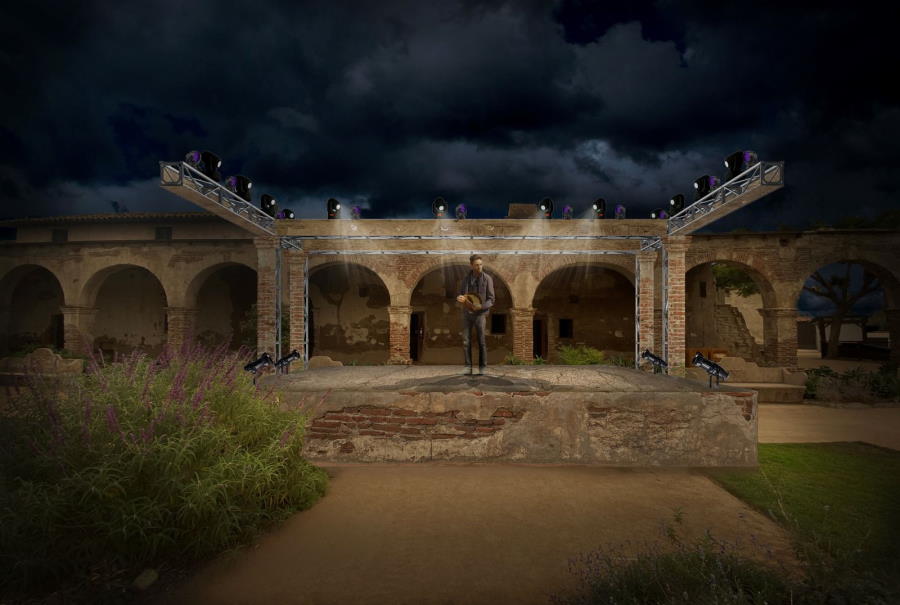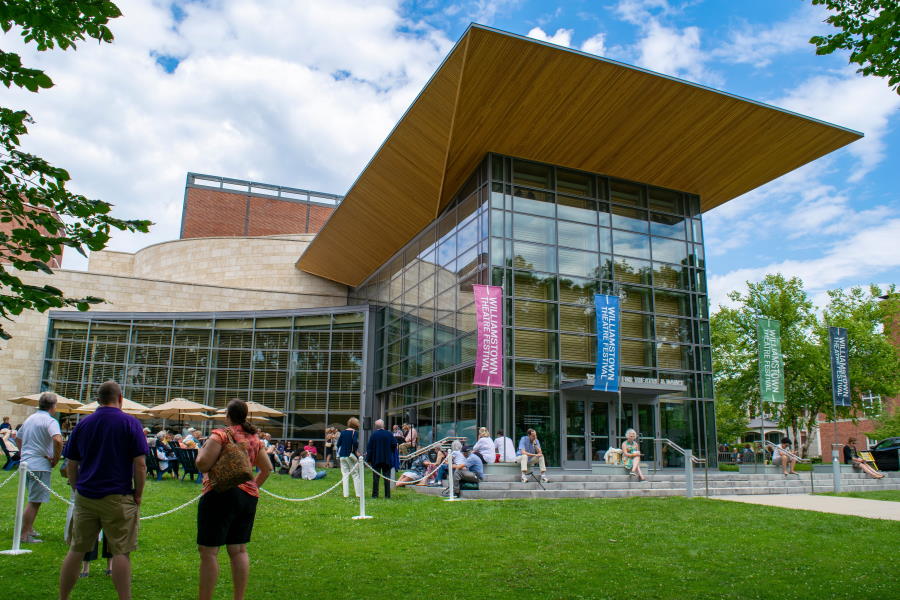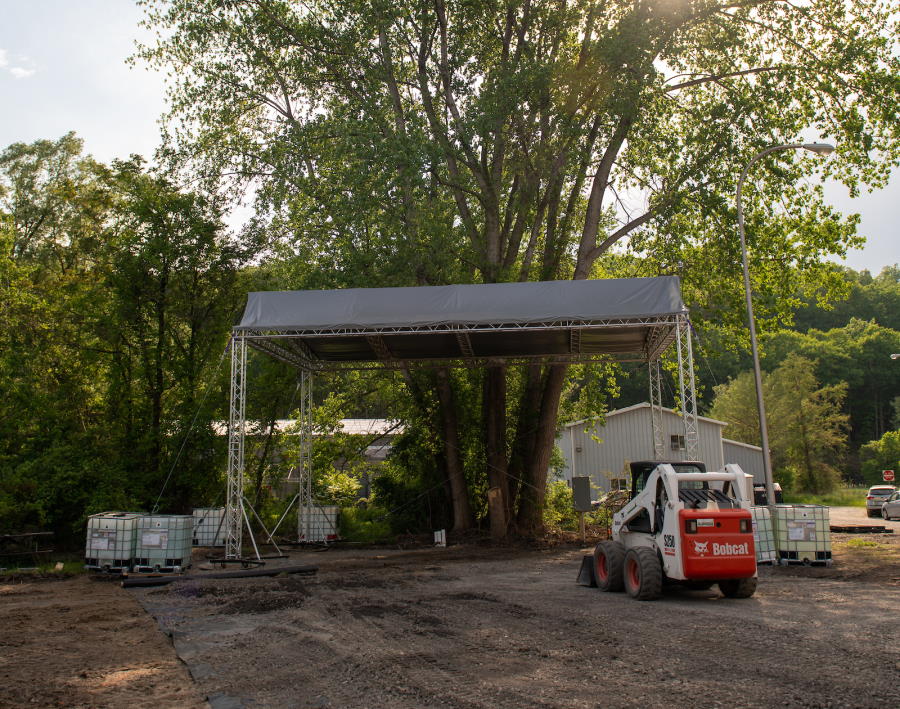Last fall the nation’s COVID-19 numbers were hitting alarming new peaks, with the approaching winter months promising even higher caseloads. A virulent new strain was on the loose and the federal response remained scattered and self-contradictory (remember this lowlight?).
Meanwhile at the nation’s theatres, which had been effectively shuttered since mid-March of 2020, it was a particularly wrenching, unmoored time. Theatre administrators and workers had spent the spring and summer reckoning with the realization that not only was it unlikely that they’d return to in-person performance by the end of 2020, but that at best they might hope to return for a “mini-season” in the spring of 2021. (Arizona Theatre Company’s October 2020 announcement of an in-person season starting in January 2021, soon rescinded in favor of more virtual productions and recently updated for the coming fall, was perhaps the field’s last flareup of irrational optimism.)
It was a scary time, then, for an interim artistic director, newly installed in the position, to suggest something completely new, hugely ambitious, and hardly cost-neutral to her board and staff. That’s exactly what Shirley Serotsky (she/her) did at the Hangar Theatre in Ithaca, N.Y.: She pitched a return to live performance in the summer of 2021. The idea of a summer return wasn’t the radical part of her plan—that’s when the Hangar typically mounts its five-show mainstage season, though they of course had to forgo last year’s. And since last fall—and especially in the past few months of encouraging vaccine adoption—summer 2021 has slowly but surely emerged as a rough-consensus contender for the Great Return we’ve all been desperate for.
It was Serotsky’s idea for the location that gave some of her colleagues pause: Instead of staging the shows at the Hangar’s 349-seat indoor venue, she proposed building a new outdoor stage next to the theatre and doing the season there.
“It took some convincing,” Serotsky admitted with a laugh in a Zoom call last month, not long after the theatre’s outdoor summer season, which runs June 17-Sept. 4, was announced. (She was instated as the theatre’s for-real, non-interim artistic director in February.) “But I did believe that it was the only way we were going to produce in-person theatre and have our community—our artists and also the audiences—feel comfortable and safe. And even then, who knew? It was still a gamble.”
It’s a gamble several other theatres are making this year. While the U.S. is home to dozens of outdoor summer theatres, many of which are happily returning to more-or-less full production schedules this year, theatres from Colorado to Massachusetts are getting in on the outdoor theatre act by taking the work outside, constructing makeshift venues in parking lots and green spaces, renting equipment, and in general doing whatever it takes to make it happen. In the process they are renewing, even rediscovering their sense of mission and service.
“It does not make any economic sense to produce in Williamstown this summer, and yet we must produce in Wiliamstown this summer,” is how Mandy Greenfield (she/her), artistic director of Williamstown Theatre Festival, put it to me in a recent call about her theatre’s plans for an ambitious multi-venue program this summer, the festival’s first outdoors. “Our theatre shares a name with a location, and we have a responsibility to this community, this region, these artists. There are moments that define what it is you stand for that come before the economic feasibility of things; we are meant to serve this area.”
If that service involves going outside the walls of the theatre, so much the better. David Ivers (he/him), artistic director of South Coast Repertory in Costa Mesa, Calif., told me that he’d been pitching his board on doing just that when the pandemic lockdown rendered their indoor spaces unusable. The result, also conceived in the doldrums of summer/fall 2020, is Outside SCR, a two-show repertory staged outdoors at the nearby Mission San Juan Capistrano. “We’ve got to not always make people come to us,” Ivers said.

If You Build It…
Playwright Idris Goodwin (he/him) was in a March 2020 meeting with his predecessor as director of the Colorado Springs Fine Arts Center (FAC) when “someone walked in the office and said, ‘We gotta shut down the theatre show, and we got to cancel the exhibition that just opened.’” Goodwin’s official start date on the job wasn’t until May 1, but, he recalled, “I was like, ‘I can’t wait and be interim; I work here now. We’ve got to start making plans right now.’”
Like many theatres, he embarked on various virtual theatre efforts—Zoom readings, playscripts, and the like—while strategizing next steps for the FAC, whose programming encompasses museum exhibits and arts classes as well as theatre. In conjunction with Christopher Sheley (he/him), director of production for FAC’s performing arts, they came up with an outdoor summer season titled City as a Venue, featuring a range of the center’s educational productions and concerts starting in June, and culminating with productions of Where Did We Sit on the Bus? (Aug. 12-22) and the musical Working (Aug. 24-Sept. 5). Events will be staged both at a specially constructed outdoor venue on the FAC campus and at various city parks.
“It’s about accessibility and reaching our full community, and not just expecting them to come to us,” Sheley enthused. He sees the pandemic, for all its challenges, as “an opportunity; it forces us out there.”
As a writer, Goodwin said his workload didn’t slow much during the pandemic. But he knew that actors and directors, not to mention devoted theatregoers, felt adrift most of last year.
“More than anything, this is something for us to do, something to wrap our heads around, something for us to focus on that’s productive,” said Goodwin. “It isn’t just us staring out the window and waiting for the snow to melt. It’s giving us something to put our energy into, which to me is what we should be doing no matter what.”
Stephen Sachs (he/him) had a similar epiphany while “sitting in my empty theatre” in East Hollywood last summer. Sachs’s Fountain Theatre typically seats 80, but whereas the space’s “intimacy has always been a blessing, when we were shut down in March, suddenly it became a curse.” He couldn’t imagine a socially distanced audience of—what?—12 people, so he figured, “Let’s go outside. It was a naive Mickey-and-Judy let’s-put-on-a-show feeling, not having any idea of what was going to be involved with it.”
Countless city permits and Equity negotiations later, the Fountain is preparing to open the West Coast premiere of Branden Jacobs-Jenkins’s form-breaking An Octoroon on a stage in the parking lot next to their venue, to run June 11-Sept. 19. The cast is rehearsing on the stage under an awning, but audiences at the 7 p.m. performances will get to watch the L.A. sun set as the two-and-a-half-hour play transpires.
Sachs had already planned to produce Jacobs-Jenkins’s bold, fragmentary play for the theatre’s regular season, but he feels its inherent theatricality makes it a natural for an outdoor staging—not to mention that its trenchant views of race and racism make it feel especially timely. Other programmers have shifted their slate in accordance with these two mandates: As the Hangar’s Serotsky put it, “Like many theatres in this country, we have examined our producing history at the Hangar and it has not been as diverse a range of voices as we would like to be producing.” And while she kept that criterion in mind, she was also on the alert for the plays that might “feel too interior. If something felt like we were trying to create an indoor space outdoors, it was clear this would not feel right.” The shows she’s chosen “don’t hide that they’re theatre, or that it’s a company of artists creating the world.” They include Idris Goodwin’s The Realness, the musicals Once and Sweeney Todd, Caleen Sinnette Jennings’s Queens Girl in the World, and a community-created The Odyssey (a partnership with Ithaca’s Cherry Arts).
For this summer’s outdoor Williamstown, Greenfield is also programming with an eye to venue and to diversity. One offering, a new musical called Row, will be staged on the reflecting pool of Clark Art Museum (July 13-Aug. 8), after having been turned into an audio play for Audible, along with the rest of last summer’s season. At an outdoor venue specially built for the lawn of the 62 Center—the Williams College site where the festival’s usual 550-seat theatre lives—they will present Celebrating the Black Radical Imagination: Nine Solo Plays, commissioned from Black writers (July 6-25). And in conjunction with producer Michael Arden’s company, Forest of Arden, and devisers Eric Berryman and Jen Silverman, they’re creating Alien/Nation, an immersive theatrical event that will span the town on foot and/or car (July 20-Aug. 8), and is “quite literally installed in the architecture of the landscape of Williamstown.”
One big unknown among the theatre leaders I spoke to was seating capacity—not only how much they could manage but whether there would be patrons eager to fill it. New York state prohibitions on mass gatherings have essentially been lifted along with outdoor mask mandates, which has meant that the Hangar’s plans for seating have fluctuated from a socially distanced 150 capacity to something closer to their usual 350. Apart from what’s allowed, though, the question is: Will theatregoers be eager to come back? Most leaders I spoke to were bullish, with some already selling out performances. As the Fountain Theatre’s Sachs put it, “I used to literally worry about, will they come? That was a few months ago now.” Based on the response from patrons, he said, “Now my worry is, will we have enough seats for everyone who wants to see it?”
At South Coast, David Ivers was also uncertain about the capacity he’d be able to seat at the makeshift venue being built for Outside SCR, but there was no question about the match of venue and show: Indeed, staging José Cruz González’s popular American Mariachi at the historic Mission San Juan Capistrano, where mariachi concerts are often held, is one of more inspired programming choices I’ve seen in a while. (The show will run in rep with a production of You’re a Good Man, Charlie Brown, July 15-Aug. 1.)
“One of the things I felt and brought to my interviews is that theatre needs to move toward a more event-based model to attract audiences, and engagement takes on a lot of forms,” said Ivers, who took the reins of the theatre in March 2019. “SCR is a very specific place, but I’m also interested in how we really engage with community and in embracing all of what surrounds us.” The pandemic lockdown, he said, “accelerated that process.” And while he confessed that by most measures it would be more efficient not to gamble with a labor-intensive repertory in a new venue, he’s driven by the theatre’s mission not only to serve audiences but to employ local workers. “Our carpenters, who are usually on contract, are now going to be the running crew for the shows,” said Ivers, who estimated that they’re already bringing back more than half of the 33 staff members furloughed in 2020. “We are literally building community with these investments,” Ivers said. “It’s a risk, in a way, but what theatre isn’t a risk?”
For Sheley at Colorado Springs FAC, the investment of the local community is buoying the effort. A regional production company that is giving the company a “very generous package on lighting and sound,” he said, are “so excited to see us open” that their rep “said point blank to me this morning, ‘I’m doing this with you—we’re gonna make this work no matter what, this is important.’ So there’s huge buy-in, and in many ways this is sort of dipping our toe back in the water after the year, starting out not full blown in the mainstage but offering performances again and getting people enthusiastic, to give them a little taste of what’s coming, hopefully in the fall.”

And Scenery
In Colorado, the picturesque mountain scenery has been another powerful draw to the outdoor. “Stunning views of the San Juan Mountains” were among the inspirations for Creede Repertory Theatre’s outdoor season, to be offered on a purpose-built stage in Seime Park for audiences in four-person boxes, according to an email from Kate Berry, the theatre’s associate artistic director. Creede Rep will stage three small-cast shows (Dear Jack, Dear Louise by Ken Ludwig, An Iliad by Denis O’Hare and Lisa Peterson, and Allison Gregory’s Red Riding Hood), in repertory June 25-Sept. 5. employing a company of 25 as opposed to their usual 80-100. “It is exciting and terrifying, all at the same time,” said Berry.
Likewise in Colorado Springs, with its views of Pikes Peak. Quipped Idris Goodwin, “No disrespect to our great scenic team, but you can’t beat a backdrop like ours.”
Indeed, these pop-up outdoor seasons, with their sense of festivity, seem like such a good idea, it’s certainly worth wondering: Why not continue them? Everyone I spoke to said that, barring total catastrophe, they would like to keep some of these outdoor efforts going. The success of last summer’s WTF Audible series opened Greenfield’s eyes to the possibilities of literally thinking outside the box of their indoor venue. “Watching these plays live on a global platform, voraciously taken in by people who never had contact with this material, definitely argue for the permanence” of this programming. On the other hand, no amount of virtual expansion can change the company’s sense of place. As Greenfield put it, “Having an accessible audible platform makes our local work more urgent. We’re broadening in both of those directions, and it gives us so much more impact. I hope we find we want to keep doing this—that when we do finally land back in the 62 center, in the dark, it’s one of three things we do. I can see that.”
Goodwin, likewise, wants to keep it all going. “We got to stay on digital. We got to stay on virtual, we got to stay making these podcasts. We got to stay outside. We got to stay inside. What is it we do? We tell stories in real time. That’s it. No one said it’s got to be in this theatre, it’s got to be done this many times, and it takes this many weeks to rehearse every single show ever made. Embrace it all. This is a celebration.”
Others said they hoped the stages they were building would have lasting service, not only for their own company but potentially for others as well. Hangar Theatre managing director R.J. Lavine (she/they), who has been charged with helping to raise money for the theatre’s outdoor season, sees this effort as an investment, not a stopgap measure.
“If I can say this with any amount of tact, very straightforwardly: Nobody wants to invest in something that’s for one year,” said Lavine. “So when we’re writing grants and we’re talking to business sponsors, we can’t just say, ‘Oh, yes, this one-shot deal, give us $50,000 to make it happen.’ People are excited about it, and they’re going to want it to exist beyond that. And for that reason, the support that we’ve gathered around it, particularly around the financial resources and in-kind resources to make this happen, necessitate keeping it for longer than just this summer.” On the other hand, Lavine conceded, “If we go through this year and we’re like, wow, we never want to do that again, we can still have it for a community space or for a rental or other uses.”
Said SCR’s Ivers, “The words I said to my board were just this: Everyone will understand why we are doing this. If it fails, it fails with an understanding of what we were trying to do. If it succeeds, it stands a chance of becoming a tradition.”
Rob Weinert-Kendt (he/him) is editor-in-chief of American Theatre. rwkendt@tcg.org





